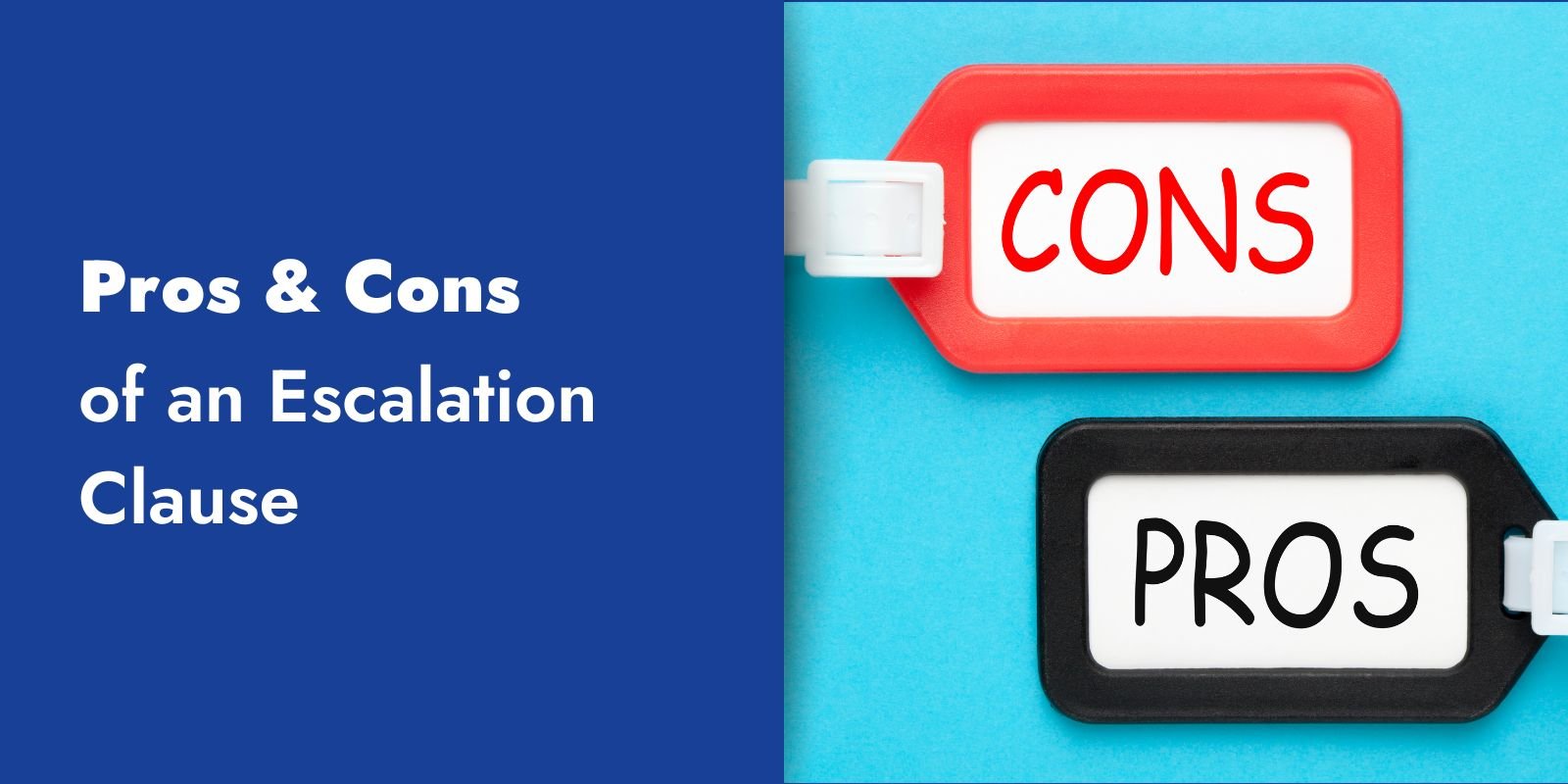Are you a home buyer looking to arm yourself with the knowledge of how to leverage real estate laws and transactions?
Then you’ll want to dive into what an escalation clause in real estate is.
An escalation clause can be an incredibly powerful tool for buyers, giving them the upper hand when entering heated bidding wars.
If used strategically, it can help you get your dream home – without breaking your budget!
We’ll explore exactly what an escalation clause is, why they’re useful in certain situations, and offer advice on how you can use one to maximize your chances of getting the perfect property.

What is an Escalation Clause in Real Estate?
A real estate escalation clause is your secret weapon when competing against other buyers for a property.
But what is it exactly?
It’s a contract condition that allows you and the seller to increase your existing offer if another party bids higher.
These so-called “escalator clauses” signal to the seller that you’re serious about the property and willing to compete.
Not only that, but a well-crafted escalation clause also includes specifics such as:
- A cap, which is the maximum amount you’re willing to spend
- The amount you’re willing to beat subsequent offers by
By conveying just how far you’re willing to go to secure the property, you’ll stand out from the crowd and increase your chances of making a successful offer.

How Does an Escalation Clause Work?
Real estate escalation clauses can seem complicated, but they are relatively easy to understand once you break them down.
Basically, they allow prospective homebuyers to offer a bit more than any additional offer submitted after their initial offering.
All in all, including an escalation clause gives you greater control in obtaining the property you want.
An escalation clause is essentially a price-increase clause included in an official real estate offer.
It informs the seller that you will automatically outbid any other offers they receive, specifying how you will do so.
This makes it more likely that you’ll get your offer accepted and the seller is less likely to reject your offer in favor of a more attractive one.
Here are the key components that an escalation clause typically includes:
- The original purchase price
- The amount that your offer will be escalated above other competitive bids
- The maximum purchase price in case of multiple offers
Say you submit an initial offer of $300,000 for a property and add an escalation clause.
It states that you’re willing to increase your offer by $5,000 above any subsequent offers up to a maximum of $350,000.
If another buyer submits an offer of $305,000, your escalation clause will automatically kick in.
Your offer will outbid the other party by the predetermined amount.
It’s important to note that while real estate escalation clauses can be relatively straightforward, it’s still helpful to work with a trusted real estate agent who can guide you through the process.
With an escalation clause, you can have the confidence to put your best foot forward and secure the property you desire.

Example of an Escalation Clause
Escalation clauses tend to cause a bit of confusion, so let’s take a look at an example:
Let’s say you’re a buyer looking to snag a charming house that’s listed at $395,000 in a seller’s market.
You submit your offer of $400,000 but want to make sure you come out on top.
So, you include an escalation clause that outlines the amount you’re willing to outbid any other buyer until you reach your max spend.
Say your escalation clause specifies that you’ll gladly pay $5,000 more than any competing offer, but only up to $415,000.
Then, another buyer enters the scene with an offer of $405,000.
Thanks to your escalation clause, you can beat that deal.
Your initial offering rises to $410,000 (the offer of $405,000 plus the $5,000 from your escalation clause).
See? Not so complicated after all!
Considerations for the Seller
When it comes to buying a home, an escalation clause can seem like a win-win for both parties.
The buyer can increase their bid incrementally while the seller has the safety net of a guaranteed higher price.
But is this really the best option for the seller?
Sure, accepting an offer with an escalation clause means the seller doesn’t have to spend time negotiating with multiple bidders.
But what if the third or fourth buyer was willing to pay even more?
With an escalation clause, the seller will never know.
That’s why sellers should consider issuing counteroffers instead of accepting the bid with an escalation clause.
There’s no limit to the number of counteroffers that can be made, and depending on the state, a seller can make different counteroffers to different buyers.
Continuing with the example above, let’s say another buyer comes in at $425,000 for the property.
That’s $30,000 more than the listing price!
The seller would have missed out on that extra cash if they had accepted an offer with an escalation clause.
If issuing multiple counteroffers isn’t appealing, the seller could also raise the home selling price to $425,000 and start the bidding process anew.
It might take longer, but in the end, the seller could come out with an even higher profit.
Considerations for the Buyer
When you use an escalation clause in your offer, it can certainly make your offer more attractive to the seller, but it also reveals your highest price to the seller.
Keep in mind that negotiation is a key part of the home-buying process.
If you negotiate with the seller, you can potentially get a better deal than using an escalation clause alone.
Moreover, an escalation clause only allows you to compete in terms of price.
Other factors that could sweeten any offer, such as a shorter timeframe for inspections, aren’t taken into account.
In other words, an escalation clause isn’t the only way to make your offer appealing, so be sure to consider all of your options when making an offer on a home.

When to Use an Escalation Clause
An escalation clause can be a powerful tool in your home-buying expedition, but it’s not always necessary.
It allows buyers who are serious about acquiring a property to potentially outbid other offers and skip the back-and-forth negotiations.
However, it’s crucial to note that in some situations, the use of an escalation clause may not be in your best interest.
It could limit your ability to negotiate on other aspects of the purchase and could even backfire—ultimately hurting your chances of getting the property.
Here are a few scenarios where an escalation clause may come in handy:
- You want the seller to know you’re serious
- You want to skip tedious bidding
- The real estate market is highly competitive, making competing offers likely
- You prefer not to negotiate with the seller
Keep in mind that it might not be the best approach when negotiating is essential to you.
Don’t forget, there are other areas where you and the seller can negotiate, and an escalation clause may take that opportunity away.
If an escalation clause is something you’d like to incorporate into your agreement, it can be used for a standard purchase agreement, a real estate lease, or a commercial lease, among others.
Remember, working with a professional real estate lawyer can give you the best chance of successfully creating this type of clause.

Pros & Cons of an Escalation Clause
If you are considering using an escalation clause, it’s important to understand the advantages and disadvantages before doing so.
You will be better equipped to make an informed decision regarding what’s included in your purchase agreement.
Pros of an Escalation Clause
Including an escalation clause in your initial offer has many benefits.
The most apparent of which is combatting the possibility of your offer being disregarded altogether.
By stating your willingness to increase your offer when necessary, you’re telling the seller that you’re not willing to be pushed into the “no” pile.
But it doesn’t stop there; an escalation clause can be a powerful tool in keeping you in the game.
It’s like a master rebuttal to the most recent offer.
You’ll be positioned to land the property of your dreams without going too far overboard.
Here are some benefits of using this strategy:
- Buyers can enjoy peace of mind and lower stress levels. Buying a home is inherently stressful, especially when you find a property you love. You don’t want to submit an offer only to worry someone else will come along with a higher bid. With an escalation clause, you can set your initial offer and provide a maximum limit. Then sit back and relax knowing that you’re covered if there’s a buyer going above you.
- It can make you a more attractive buyer. Sellers are more likely to choose an offer that appears strong and credible. By using an escalation clause, you signal that you’re the real deal and genuinely want the property. It shows that you’re willing to take the extra steps to make it happen.
- An escalation clause can save you from overpaying for a property. Nobody wants to spend more than necessary for a home. With an escalation clause, you’ll only have to pay more if someone else bids higher than you. This will ensure that you don’t go beyond the price range that you have set for yourself.
Overall, an escalation clause can not only give you peace of mind but also help you secure the home of your dreams at the right price.
Cons of an Escalation Clause
Escalation clauses have some drawbacks as well.
Let’s explore them:
- An accepted escalation clause means no more negotiations between the buyer and seller. By revealing their highest offer, the seller knows the buyer’s ceiling amount immediately, erasing further back-and-forth talks. It can also remove the bargaining power from the buyer, giving the seller more control. Alternatively, the seller may dismiss the escalation clause and ask for the highest bid.
- Sellers who approve escalation clauses are restricted from counteroffering to other buyers. Since buyers could hold back their maximum offers with an escalation clause, sellers may reject the clause right away.
- Escalation clauses can cause appraisal issues if the offer exceeds the home’s appraisal value. Mortgage lenders have specific criteria for mortgage loans and require an appraisal to decide a home’s market worth. If an escalation clause results in an offer higher than the home’s appraised value, it could create a situation in which the price offered exceeds the mortgage amount lenders are willing to offer. In such cases, the buyer must make up the difference in cash if they wish to purchase the home.

Wrapping up our Guide to Escalation Clauses in Real Estate
All in all, an escalation clause can be a viable and beneficial option for both buyers and sellers if properly understood and implemented into a real estate contract.
It’s important to thoroughly weigh the pros and cons of an escalation clause before making any decisions
Familiarize yourself with the terms and conditions of your escalation clause that must be met in order for it to take effect.
If you’re looking to protect yourself from other bidders or simply want more control over the price of a property, an escalation clause might be just what you need.
Real estate agents can provide valuable guidance on when an escalation clause would best work for you based on your circumstances.
Finding a real estate agent that you can trust and rely on when buying or selling a home is essential.
Helen Painter Group Realtors is here to offer our expertise when it comes to structuring your real estate contract – whether it contains an escalation clause or not.
A long-standing and trusted Fort Worth real estate agency, we’ve been serving buyers and sellers since 1958.
With more than six decades of success, you can rest assured that your best interests are represented throughout the buying or selling process.
To learn more or speak with an agent, feel free to give us a call at (817) 923-7321 or contact us.

